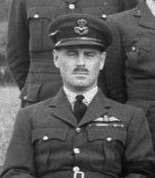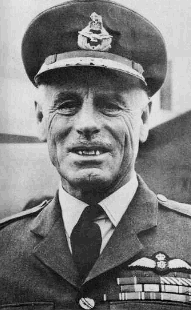Edward Fielden (RAF officer)
Air Vice-Marshal Sir Edward Hedley "Mouse" Fielden, GCVO, CB, DFC, AFC (4 December 1903 – 8 November 1976) was a senior Royal Air Force commander and a pilot of the Second World War.
Sir Edward Fielden | |
|---|---|
 Edward Fielden in 1942 | |
| Nickname(s) | "Mouse" |
| Born | 4 December 1903 Bracknell, England |
| Died | 8 November 1976 (aged 72) Edinburgh, Scotland |
| Allegiance | |
| Service/ | |
| Years of service | 1924–1968 |
| Rank | Air Vice-Marshal |
| Commands held | Queen's Flight (1947–62) RAF Tempsford (1942–45) No. 161 Squadron (1942) |
| Battles/wars | Second World War |
| Awards | Knight Grand Cross of the Royal Victorian Order Companion of the Order of the Bath Distinguished Flying Cross Air Force Cross Mentioned in Despatches (2) |
Early life
He was born in Bracknell, Berkshire, the son of a doctor. He was educated at Heatherdown School, Ascot, and Malvern College. He obtained a short service commission with the Royal Air Force in 1924, flying with No. 25 and then No. 23 Squadron in 1925 and 1926. He was posted to the meteorological flight at Duxford in September 1926. After his five-year commission, he was posted to the Reserve as a flight lieutenant.
Flying the royal family
Fielden figured largely in the flying activities of the Royal Family for more than three decades, and most important royal flights were subject to his scrutiny and recommendation. His discretion and self-effacement earned him the nickname of "Mouse". His association with the Royal Family began in 1929, when the then Prince of Wales (later to become King Edward VIII), who had acquired a Gipsy Moth, appointed Fielden as his personal pilot. In October 1933, the Prince appointed Flight Lieutenant Fielden as his Chief Air Pilot and Extra Equerry. With the death of King George V on 20 January 1936, Edward VIII succeeded to the throne, and on 21 July, Fielden was appointed Captain of the King's Flight. Edward's reign was short-lived, abdicating on 11 December 1936 and being succeeded by his brother George VI. Fielden was retained as Captain of the King's Flight and his role was expanded. He was charged with the carriage not only of members of the Royal Family, but also members of the Air Council and other important state personages.
Second World War
Fielden had remained in the RAF Reserve and was promoted to wing commander in 1936. With the outbreak of the Second World War he returned to the service. In early 1942 he was chosen to be the commanding officer of the newly forming No. 161 Squadron. The squadron was built from No. 138 Squadron's "C" Flight (the Lysander flight) and the King's Flight. The squadron shared the airbase at RAF Tempsford with 138 Squadron. In October 1942, he was promoted to group captain and assumed command of RAF Tempsford, where 138 (Special Duties) Squadron was now also based. Fielden played an important role in directing operations in support of the resistance movements in Europe. He was awarded a Distinguished Flying Cross in April 1943. Later that same year, his services to the Royal Family were recognised by his appointment as a Commander of the Royal Victorian Order. Early in 1945, he was appointed commander of the base at RAF Woodhall Spa.
Post-war career

After the war, in May 1946, the King's Flight was reformed with Fielden once again its Captain. He was created a Knight Commander of the Royal Victorian Order in 1952. Following the death of King George VI on 6 February 1952, he was confirmed in his royal appointment. The unit was renamed as the Queen's Flight soon after the accession of Queen Elizabeth II.
Fielden retired from the Queen's Flight in 1962. At the same time, he was appointed Senior Air Equerry to the Queen and promoted to air vice marshal. He was advanced to Knight Grand Cross of the Royal Victorian Order in 1968 and retired as Senior Air Equerry in 1969.
Fielden died on 8 November 1976 in Edinburgh, Scotland, at the age of 72.
Family
Fielden married Mary Angela Jodrell, the daughter of Lieutenant Colonel H. R. Jodrell, in 1940. He had a son, who predeceased him, and a daughter. Lady Fielden died in 2014 at the age of 98.[1]
References
- Obituary: Sir Edward Fielden, Flying the Royal Family. The Times, 9 November 1976
External links
- Brief biography of Sir Edward Fielden. www.rafweb.org
- Edward Fielden. Oxford Dictionary of National Biography. Retrieved 1 July 2010.
- Royal Holiday, Flight magazine, 13 August 1954, pp 224. Flightglobal Archive. Retrieved 1 July 2010.